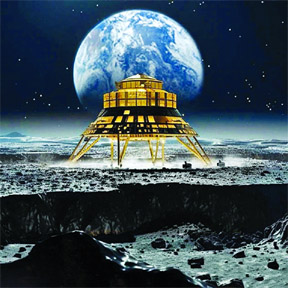
As the modern-age lunar race picks up pace, Russia and China are setting their sights on the moon with plans to establish a nuclear power plant. The power plant is expected to be established on the lunar surface between 2033 and 2035. Yuri Borisov, the head of Russia’s space agency Roscosmos, revealed this ambitious project in a statement, highlighting a significant collaboration between the two nations in advancing lunar exploration.
Borisov, who has a background as a former deputy defense minister, emphasised the collaborative efforts between Russia and China in a joint lunar program. He pointed out Russia’s valuable contribution with its expertise in “nuclear space energy,” marking a pivotal step towards sustainable lunar habitation.
The initiative aims to overcome the limitations of solar panels, which Borisov noted would not be enough for the electricity demands of future lunar settlements. Instead, nuclear power emerges as a viable solution to fuel these extraterrestrial habitats.
The complexity of delivering and installing a power unit on the lunar surface was acknowledged by Borisov, who stressed the importance of automating the process to avoid human presence during the initial stages.
This approach points to the challenges and risks associated with deploying nuclear technology in space.
Further expanding on Russia’s vision for space innovation, Borisov discussed the development of a nuclear-powered cargo spaceship, dubbed a “space tugboat.” This vessel, described as a “huge, cyclopean structure,” would leverage a nuclear reactor and high-power turbines to transport large cargoes between orbits, collect space debris, and fulfill other critical functions.
Despite the resolution of most technical questions surrounding the project, cooling the nuclear reactor remains a significant hurdle yet to be overcome. Russia’s lunar ambitions have been marred by setbacks, including the failure of its first moon mission in 47 years last year when the Luna-25 spacecraft crashed after spinning out of control.
However, Moscow remains undeterred, with plans for further lunar missions and explorations of a joint Russian-China crewed mission and even a lunar base. This comes as China announces its goal to send the first Chinese astronaut to the moon before 2030, signaling a competitive yet collaborative race to lunar colonisation. Amidst international concerns over the militarization of space, Russian President Vladimir Putin has dismissed US warnings about Russia’s intentions to deploy nuclear weapons in space.





Be the first to comment